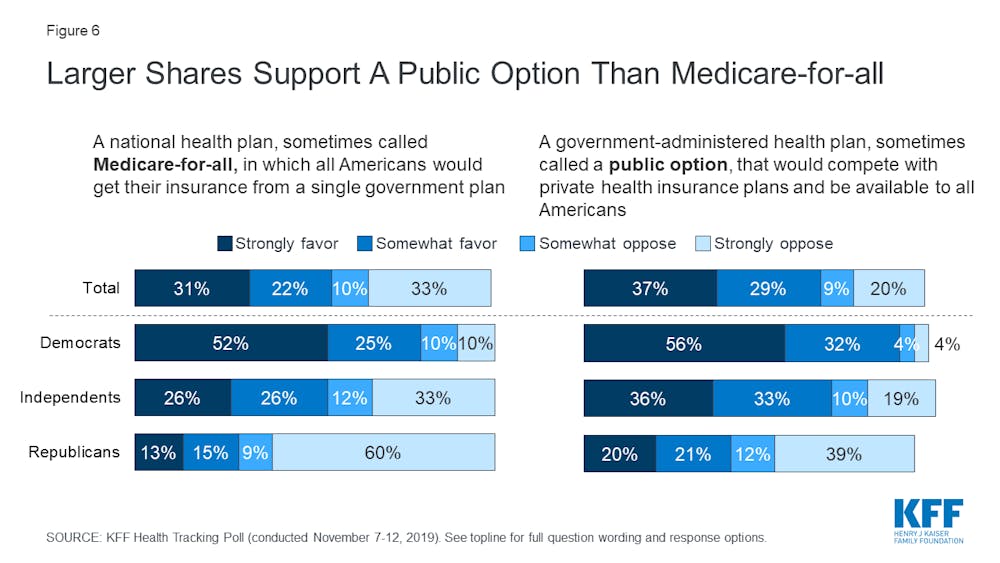The issue of healthcare has been front and center on the Democratic primary debate stage and has been a continuous topic in our nation’s political discourse since the inception and implementation of the Affordable Care Act (Obamacare.)
It can also be traced back to President Bill Clinton’s push for universal healthcare and even back to the creation of Medicare and Medicaid.
In short, it’s an important, far-reaching topic and is political red meat. If you run for office you better have a plan for healthcare - or at least an epithet to invoke and repeat.

Americans are engaged in the healthcare debates and want plans continually discussed. Retrieved from a November 2019 Kaiser Foundation article: https://www.kff.org/health-reform/poll-finding/kff-health-tracking-poll-november-2019/
Sen. Bernie Sanders has run since 2016 on single-payer healthcare or “Medicare For All” and several of his opponents in the primary have picked up that torch for 2020 in varying degrees. Many still see a role for private insurance in either the rollout process of single-payer or as an organic next step in expanding coverage. The most popular phrasing of this is a “public option” where a federal public plan would compete in the insurance marketplace against private, often employer-sponsored plans.
The victorious Democrats in 2018’s “Blue Wave” ran overwhelmingly on a platform of expanding the ACA and potentially including this “public option,” which was scrapped in the original Affordable Care Act because it was viewed as a liability for the major program’s passage.
The battle among the Democrats on the debate stage is framed as a “Medicare For All” versus “public option” standoff. Progressives like Sens. Warren and Sanders push for ending the role of private insurance (at least eventually) and more moderate candidates like Sen. Amy Klobuchar emphasize choice and competition as important elements in providing healthcare. They spar over taxes, costs and political expediency of their plans and speak many half-truths about the strengths and weaknesses of their plans.
The truth is that there are several factors that could make both proposals dead on arrival.
First, Mitch McConnell and the Republicans may resume control of the Senate, as the Senate map in 2020 isn’t greatly indicative of a Democratic victory. McConnell calls himself the “grim reaper” for a reason and these bills would most likely fall victim.
Second, insurance companies and care networks have begun leveling controlled opposition to these plans. The insurance lobby is wildly powerful and they’re putting out television ads and polling mechanisms to convince voters not to embrace government-funded plans for fears of closing rural hospitals, higher taxes and lower quality care. They also have significant sway in the legislative process via lobbying and campaign contributions.
Finally, Democrats have to convince those in their own party and among Republican ranks to support these plans. Obstacles in this are the Blue Dog Coalition in the Democratic Party and members like Joe Manchin who are more conservative than the generic Democrat, as well as an increasingly obstructionist Republican party which has seen their more moderate members retire or lose re-election.
While polls show bipartisan support for both plans for some degree among voters, that is not necessarily translated to the positions of membership in Congress.

There is more support for the public option among all demographics polled - including Republicans. However, the results are not wildly resounding and are not likely to translate to House and Senate Republicans changing their stance on either plan.
Figures like Biden, Klobuchar and others on the more moderate-to-conservative end of the party may be correct when they argue that the public option and related incremental plans have more political capital but Republicans typically oppose any attempts to nationalize healthcare or make steps toward that end.
This is not to say that either plan has no merits or that their sponsors and advocates should stop pushing them. Nor is it a claim that other innovations aren’t happening in healthcare at the state level and within Congress.
I would prefer, however, that voters were given honest information about the chances of passing these bills and implementing their provisions. While each plan has its own merits, especially within the Democratic party and among a slim majority of voters, there is a long, uphill battle which will require intense political capital in passing both. While it is understandable that casting doubt within your electorate isn’t a great electoral strategy and doesn’t make for inspiring rhetoric, it is important that voters understand the factors at play.
Be wary of candidates who claim “we can get this public option done” (Klobuchar) while fighting against Medicare For All or those who paint candidates who espouse the public option as “void of big ideas” (Warren.) These are both plans that would meaningfully change American healthcare for the better, albeit on different timelines. And they both have a legislative path fraught with obstacles. Big plans need to be workable and the verdict is not yet out on how workable either of these plans are.










